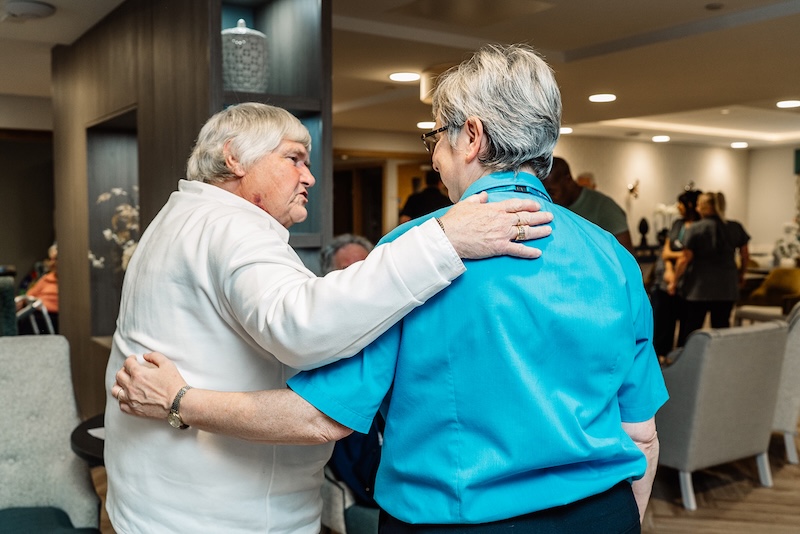When Should Someone With Dementia Go Into a Care Home?

Understanding when it's the right time for a loved one with dementia to move into a care home can be an extremely difficult decision for a family to make. Dementia is a progressive condition that impacts mental capacity, communication, and the ability to manage daily tasks, which can make remaining at home increasingly challenging over time. While every individual’s journey with dementia is unique, recognising the signs that additional support is needed can help make this transition easier for both the individual and their family.
In this blog, we’ll explore the key factors to consider when deciding whether a care home is the right choice, the dementia care options and practical advice for finding the right care setting for your loved one.
When a Person’s Living Environment is No Longer Safe
A safe living environment is essential for anyone, but for a person with dementia, safety becomes an even greater priority as their condition progresses. Simple tasks such as remembering to turn off appliances, lock doors, or navigate stairs can become significant risks. Disorientation and confusion can lead to accidents or wandering and could indicate it would be time for them to move to an environment that can keep them safe 24 hours a day.
If safety becomes a concern, a care home can provide the secure environment your loved one needs. Care settings often include features such as 24-hour supervision, dementia-friendly layouts, emergency response systems and one to one dementia care ensuring your loved one is both safe and supported around the clock. These facilities are designed to maintain as much independence as possible while giving family members peace of mind.
When Their Care Needs Exceed Family’s Abilities
Caring for a person with dementia often becomes a full-time responsibility as their condition progresses from early-stage dementia to the later stages. Family members may struggle to meet the increasing demands, which can lead to stress, exhaustion, and burnout. As difficult as it may be to admit, there may come a time when the level of care required surpasses what can be provided at home.
Care homes are equipped to provide professional support for those with dementia, including tailored care plans, sensory activities, and access to medical expertise. By transitioning to a care home, families can focus on quality time with their loved ones while ensuring they receive the best possible care in a safe, supportive environment.

Individuals Are Experiencing a Lack of Social Interaction
Social engagement plays a vital role in maintaining cognitive and emotional well-being. However, individuals with dementia can often become isolated at home, which can lead to a decline in their physical and mental health. Limited interaction with others may increase feelings of loneliness and frustration, further impacting their dementia symptoms.
Care homes provide opportunities for residents to participate in activities and form friendships and connections with others. From group exercise sessions to reminiscence therapy, these interactions not only help to stimulate cognitive function but also create a sense of belonging and joy. Regular family visits can further strengthen relationships and ensure your loved one continues to feel connected to their family and local community.
Financial Considerations for Dementia Care
The cost of living is a growing concern for many families, and this can be especially challenging for individuals with dementia who may struggle to manage their property and financial affairs. Care homes can alleviate some of this burden by providing an all-inclusive fee typically covering accommodation, meals, utilities, and specialised care.
Local authorities and the NHS can offer financial support options for families concerned about affordability based on needs assessments or financial situations. Seeking advice from the local authority or a qualified professional can help you weigh up your options and find the best solution for your loved one.
Seeking Professional Guidance
Navigating the complexities of dementia care can be overwhelming, which is why seeking guidance from healthcare professionals, such as GPs, social workers, or dementia specialists, can be important. These professionals can assess your loved one’s needs and provide tailored advice on the most appropriate care options.
Involving your loved one in the decision-making process, where possible, is also important. Communicating openly and providing reassurance about the move can help ease the transition and make them feel valued and understood.
Finding the Right Care Home
Choosing a care home or nursing home for a loved one with dementia is a significant decision, and finding the right setting that can provide medical and personal care is key to their comfort and well-being. It is important to look for a care home that offers a warm, welcoming atmosphere, dementia-friendly facilities, and highly trained staff who specialise in providing dementia care. Many care homes also offer tailored activities designed to promote cognitive function and enhance quality of life.
A private bedroom with space for personal items, such as photos and home comforts, can help create a sense of familiarity and comfort for residents. When visiting care homes, it is important to ask about their approach to care planning, as a thorough, individualised care plan is essential for meeting the unique needs of each resident.
Inclusive Decision-Making and Family Involvement
It’s important to involve your loved one in decisions about their care wherever possible and ensure their individual preferences are considered. Maintaining open lines of communication and reassuring them about family visits or daily routines can help ease feelings of isolation. Obtaining lasting power of attorney can also help families manage important decisions on behalf of their loved ones when necessary.
Organisations like Age UK and the Alzheimer’s Society provide valuable resources and advice for families navigating these challenges, helping to ensure that every decision is made with the individual’s best interests at heart.
Our Exceptional Dementia Care at Pottersway House
At Pottersway House Care Home, we understand the complexities of dementia and the difficult decisions families face. From a vibrant activities program and hair salon to thoughtfully designed spaces, we aim to create a safe and supportive environment where our residents can thrive.
Alongside one to one dementia care, we also offer residential care, nursing care and respite care in Church Lawton. With tailored care plans, regular engaging activities, and dementia-friendly facilities, we strive to help residents live fulfilling and meaningful lives. Our staff are committed to delivering exceptional, person-centred care that is tailored to the unique needs of each resident.
If you’re considering dementia care options for a loved one, we invite you to visit Pottersway House. Our compassionate team is here to answer your questions, offer guidance, and support you every step of the way. Contact us today to learn more about the dementia care services we provide or to arrange a tour. Let us help you make this important decision with confidence and care.






